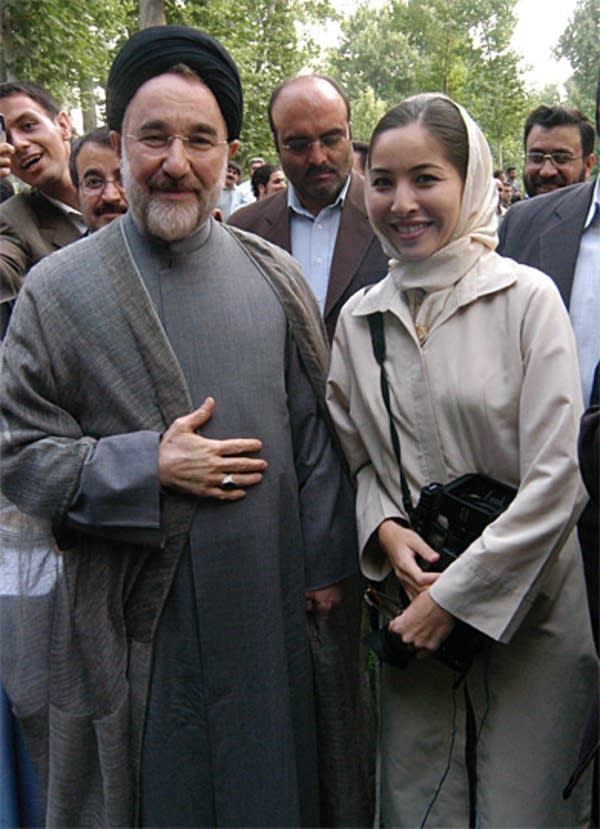Journalist held in Iran was classic overachiever

(AP) - Roxana Saberi grew up as a classic overachiever, an introverted but determined young woman who excelled at piano and overcame her shyness to become Miss North Dakota and succeed in journalism.
Now the 31-year-old American reporter is the focus of international attention after Iranian authorities charged her with espionage.
A dual citizen of the U.S. and Iran, she was arrested in January and has been detained in a prison north of the capital Tehran.

Saberi has lived in Iran for the last six years. She was initially accused of working without press credentials, but a judge on Wednesday leveled the much more serious allegation: Spying for the United States.
Create a More Connected Minnesota
MPR News is your trusted resource for the news you need. With your support, MPR News brings accessible, courageous journalism and authentic conversation to everyone - free of paywalls and barriers. Your gift makes a difference.
Saberi will stand trial next week. The Obama administration and national news organizations have been pushing for her release.
The case has shocked and alarmed Saberi's friends, teachers and former colleagues in Fargo, where she grew up, attended college and started her journalism career.
"She's just a sweet, genuine person," said Cindy Larson-Casselton, whose late husband was a media studies professor at Concordia College and a mentor to Saberi. "She was a babysitter for us, and we saw in her a wonderful role model for our own daughters."
Saberi's father is Iranian and her mother Japanese, but she was born in the United States and attended school in Fargo.

Her ninth-grade history teacher, Vic Youngs, called her "one of the brightest people I've ever had in class."
At Fargo North High School, she plowed through advanced placement courses and was active in extracurricular activities including soccer and piano -- both of which she continued at Concordia College in nearby Moorhead, Minn.
Kristi Rendahl, a college classmate who stayed in touch with Saberi and now runs a St. Paul, Minn., consulting business, said her friend thrived in whatever she did despite a natural introversion.
"She didn't command a lot of attention from people personality-wise, but just by way of excelling in everything, she got attention that way," Rendahl said. "She was the classic overachiever, driven."
In 1997, at the urging of a college instructor with experience in the pageant world, Saberi decided to compete in the Miss North Dakota contest.

She won, and made it to the Top 10 in that year's Miss America pageant. She played piano for the talent portion.
"It was the first time anyone could remember that North Dakota made it nearly that far," said the instructor, Merrie Sue Holtan.
By the late 1990s, Saberi had landed a job as a reporter for KVLY, Fargo's NBC affiliate. Charley Johnson, the general manager who hired her after teaching her in a class at Concordia, called her bright, inquisitive and dedicated.
Though it was hard to get her to talk about herself, she said she wanted to be a foreign correspondent.
"No one ever doubted she would achieve that," Johnson said.
Mel Stone, a photojournalist who worked with Saberi at KVLY, recalled how for a time she traveled 250 miles to the Twin Cities every weekend to see a voice coach.

She also studied Farsi and later attained master's degrees in broadcast journalism and international relations. She had been working on another master's in Iranian studies.
Friends said it was Saberi's curiosity about her heritage that took her to Iran in the first place.
"I think at least in part, it was an identity search," Holtan said. "She wanted that part of her history and her family to be more known to her."
Saberi has been a freelance reporter for organizations including National Public Radio and the British Broadcasting Corp.
The government apparently revoked her press credentials more than a year ago, but continued to let her work on some stories.
Cathy McMullen, a Concordia journalism instructor, said Saberi's interests as a reporter ran less to Iran's political situation and more to the lives of everyday Iranians.

"She said she liked to do stories on everyday life in Iran, so people could understand the culture," McMullen said. "That's why this espionage thing makes no sense. She was not doing hot political stories."
Her father, Reza Saberi, told The Associated Press after her arrest that she had been working on a book about the culture and people of Iran, and hoped to finish it and return to the United States this year.
Reza and Akiko Saberi were allowed to visit their daughter in prison Monday for about 30 minutes. It was the first time they had spoken to her since she called them on Feb. 10 to say she had been arrested.
Hank Tkachuk, another Concordia professor, said he spoke to Saberi about the potential dangers of working as a reporter in a country that restricts journalistic access.
"At that time, she didn't feel she was doing anything there that would cause any difficulties," he said. "She assured me she was well aware of the risks and felt it was important for her to be there."
(Copyright 2009 by The Associated Press. All Rights Reserved.)
